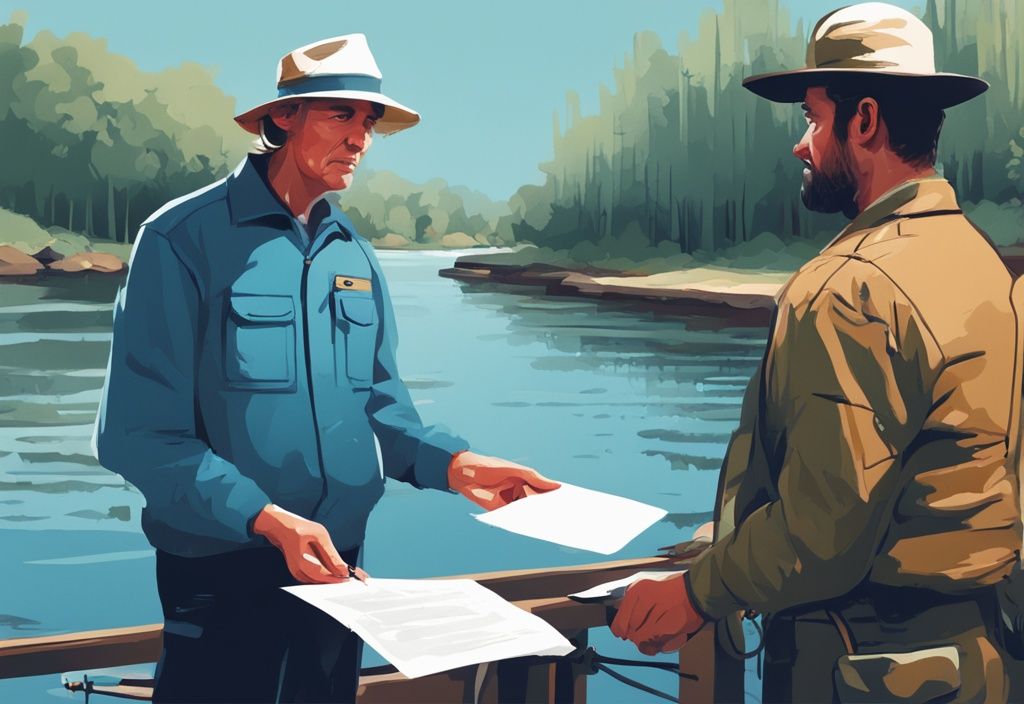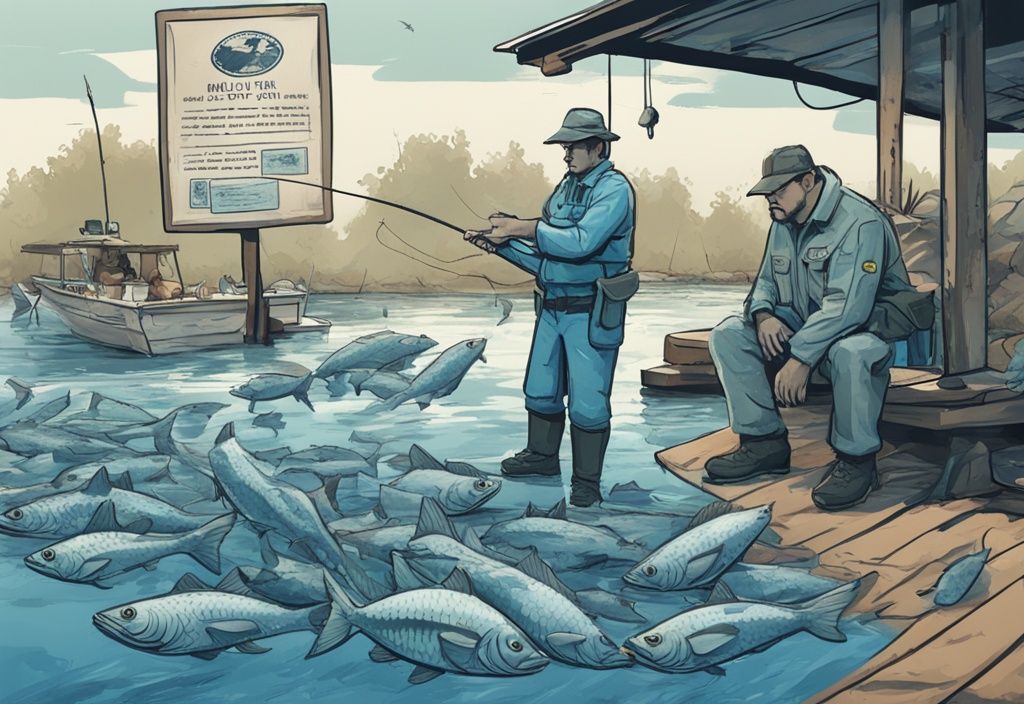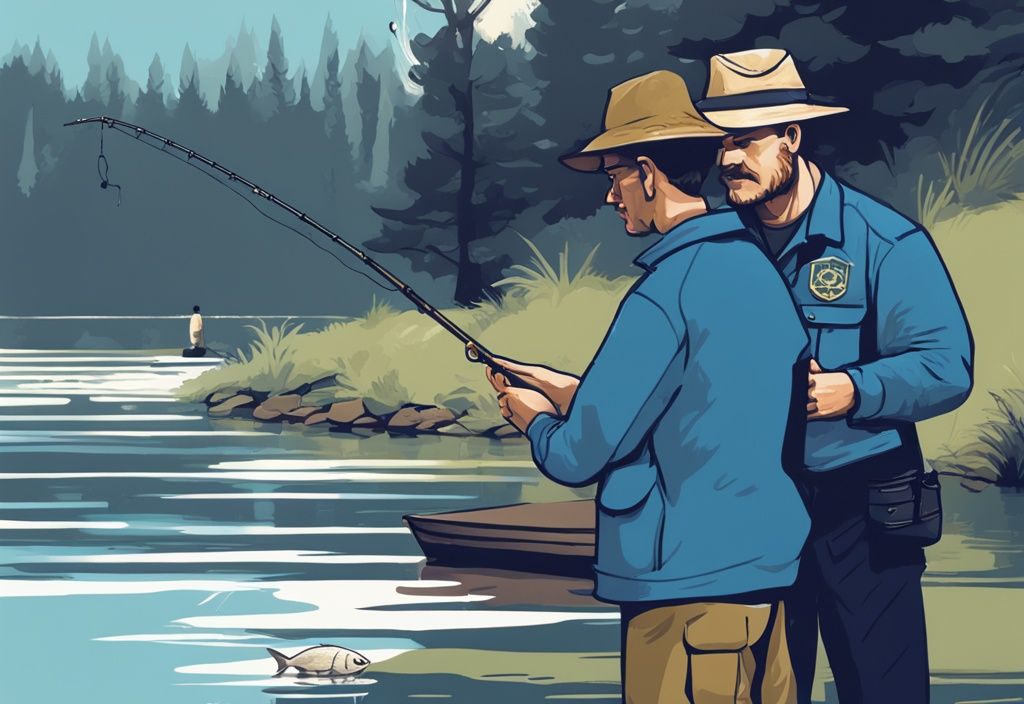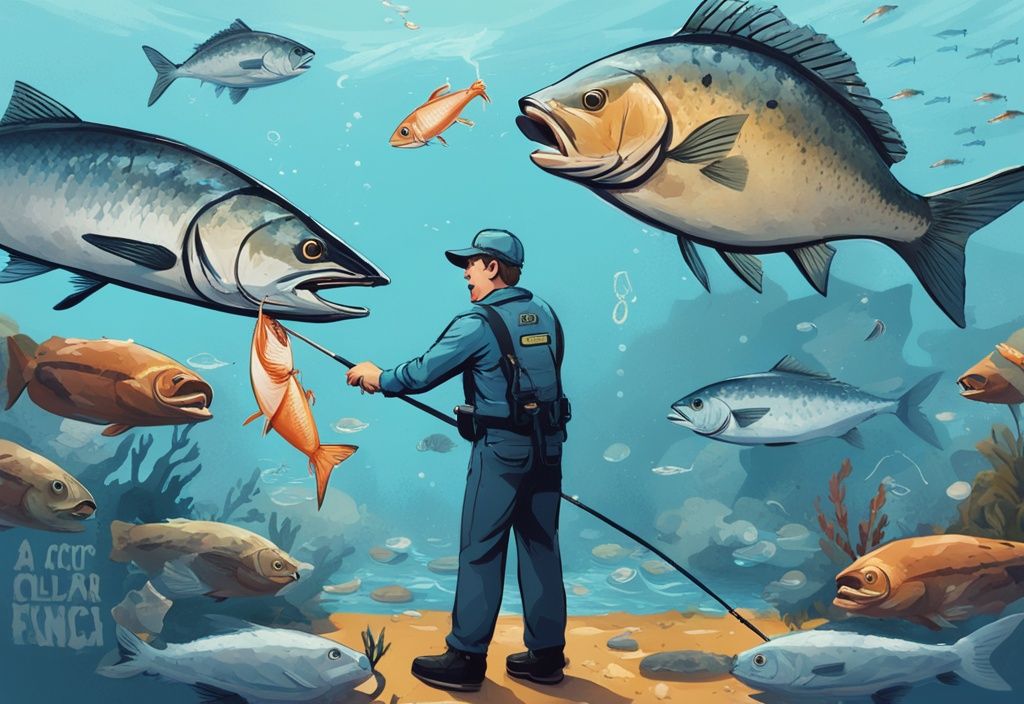Ever wonder what really happens when people violate fishing regulations? I did too. As a passionate angler for the past 20 odd years, I’ve seen the good, the bad, and the ugly of fishing. But trust me, violating regulations is far worse than a snagged line or a broken rod.
We’ll dive into the consequences of breaking these rules, which span far more than just legal penalties. Picture substantial ecological damage, disrupted marine ecosystems, and fishing communities taking a serious economic hit.
It’s not just about following the law, folks. Grasping the ripple effects of violations can turn us into ethical anglers together, fostering fishing practices that will keep our favorite hobby thriving for future generations.
Understanding Fishing Regulations
Introduction to Fishing Regulations and Their Purpose
Fishing regulations are established to preserve the health and sustainability of aquatic ecosystems. They set guidelines to control fishing methods, seasons, and catch limits to prevent overexploitation of fish populations. Adhering to these regulations ensures that fishing activities do not disrupt the delicate balance of marine and freshwater environments. But what happens when people violate fishing regulations? It’s more than just a slap on the wrist—it’s a serious issue that can have long-lasting impacts on our waters and communities.
Regulations Ensure Sustainable Fish Populations
Sustainable fish populations are crucial for both ecological balance and human consumption. Regulations are designed to limit the quantity and size of fish that can be legally caught. This practice helps maintain a stable environment where fish can breed and grow to maturity, thereby supporting long-term fishing opportunities. Without these rules, fish stocks could be rapidly depleted, endangering future harvests.
Imagine casting your line into an empty lake—not a nibble in sight. That’s the grim reality we face without sustainable practices. We’ve all heard those fishing tales where someone caught a massive haul. Well, imagine if everyone did that, all the time. The waters would be barren.
Help Maintain Ecological Balance and Protect Endangered Species
Fishing regulations play a significant role in maintaining ecological balance by preventing overfishing and by protecting vulnerable and endangered species. Specific rules may designate certain areas as protected zones or establish “no-catch” periods, known as silent seasons, allowing fish populations to recover and breed. Protecting these species is vital not only for biodiversity but also for the health of the entire ecosystem, as each species plays a unique role in their habitat.
Picture this: You’re out on the water, and the air is still. It’s silent season, giving fish time to recover. When it’s over, you come back, and the fish are plentiful. That’s the benefit of following the rules—they create better fishing stories for everyone.
Regulations May Vary by Country, State, or Region
Fishing regulations are not uniform and can vary significantly depending on the country, state, or region. Local environmental conditions, the state of fish populations, and human impact all influence these rules. It’s essential for anglers to familiarize themselves with the specific regulations of the areas where they plan to fish, as non-compliance can lead to serious consequences. Violating local regulations not only threatens fish populations but can also result in hefty fines, seizure of equipment, and other legal repercussions.
The last thing you want is a fabulous fishing trip to become a nightmare because you broke a rule you weren’t aware of. Trust me, no one wants to deal with confiscated gear or paying fines. So, do your homework, know the regulations, and keep the waters bountiful for all of us.
Common Types of Fishing Violations
Overfishing: The Unseen Impact
Overfishing is more than just a big haul; it’s a silent crisis beneath the surface. Imagine dragging up more fish than a lake or ocean patch can handle—sounds good, but it isn’t. This practice strips fish populations bare, sometimes crashing local fisheries for good. The underwater world suffers too, as ecological balance gets tossed overboard. Fish aren’t just numbers; they’re part of a fragile web, and when they’re gone, the whole dance of life in the water hits a snag. Communities that cast their nets for a living find their wallets and dinner plates emptier, caught in the crossfire between nature and need. The ripple effects sink deep, endangering the very backbone of both biodiversity and fishing folks’ livelihoods.
The Risk of Fishing in Restricted Areas
Restricted areas aren’t just random no-go zones—they’re lifelines for endangered species and dwindling fish stocks. Sneak into these off-limits waters, and you’re not just a line in the water; you’re tangling with vital conservation efforts. It’s like walking into a nursery with muddy boots—delicately balanced ecosystems such as coral reefs and fish nurseries could suffer unintentional harm. The consequences aren’t just for the fish; they hit violators hard too, with hefty fines and legal entanglements. Illegal fishing here means habitat destruction and putting already endangered species on a tighter leash.
Fishing During Silent Seasons: The Consequences
Silent seasons are the fish world’s version of a baby boom. They’re sacred times when certain species need peace to breed and replenish. Cast your line during these silent periods, and you mess up more than just fish populations; you disrupt a life cycle that needs its rhythm. Think about it—less fish today means fewer fish tomorrow. It’s a domino effect with hefty legal and environmental costs. Break the rules, and you’re staring at fines, maybe even losing your fishing license. Respecting silent seasons isn’t just a rule; it’s a crucial step toward keeping our waters teaming with life.
Illegal Methods and Their Repercussions
Using outlawed methods like explosives, poisons, or specific nets is a surefire way to wreak havoc on marine life. These tactics don’t just haul in more fish; they carpet bomb the underwater world, killing non-target species and laying waste to habitations. If you think you’re getting away with it, think again. The legal net is wide and strong, with severe fines and the possibility of criminal charges looming. Gear and catches aren’t just confiscated; they’re gone for good, leaving violators to face significant financial and operational setbacks. Going rogue with illegal methods is a fast track to sabotaging not only conservation efforts but the very essence of our beloved marine ecosystems.
Immediate Fallout from Fishing Violations
When individuals violate fishing regulations, authorities can immediately take action, resulting in the seizure of fishing equipment and other severe consequences.
These actions serve as serious deterrents to ensure compliance with fishing laws and protect aquatic ecosystems.
Seizure of Fishing Equipment
When folks break the rules out on the water, authorities don’t mess around—they can seize any fishing gear involved in the illegal activity on the spot. And let me tell you, this isn’t just about slapping violators on the wrist. It’s a strategic move aimed at stopping illegal fishing dead in its tracks.
Imagine having your cherished boat, prized nets, and any other fishing tools taken away just like that. It’s a hefty price to pay, and it hits where it hurts most—in the wallet and the heart. The immediate loss of valuable assets like this is designed to make anyone think twice before crossing the line again. No gear? No fishing. It’s as simple as that, and it’s incredibly effective at keeping would-be violators on the straight and narrow.
Forfeiture of Fish, Vessel, and Fishing Gear
Think losing your gear sounds bad? It gets worse. Violating fishing regulations can also lead to the forfeiture of the caught fish, the vessel you used, and any fishing gear involved. Yup, you heard me right—everything goes to the authorities, leaving you empty-handed and facing consequences that echo loud and clear.

Handing over your catch and equipment isn’t just about punishment; it’s about sending a strong message. Look, the financial blow from losing a boat and all your gear can be devastating. It’s a stern reminder of why following fishing laws is no joke. When your prized possessions and hard-earned catch are taken away, it makes the point that illegal fishing isn’t worth the risk.
So, the next time you’re out on the water, remember this: sticking to the rules not only keeps your fishing dreams alive but also protects the sport we all love. After all, nobody wants to see their beloved boat taken away by the authorities, right? Tight lines, and fish responsibly!
Legal Ramifications: The Penalties for Fishing Violations
The world of fishing is not just about the thrill of the catch; it’s also governed by a set of regulations that ensure sustainability and fairness. Here’s what happens when people violate fishing regulations. The consequences can range from financial setbacks to criminal repercussions, each designed to uphold the integrity of our waterways.
Monetary Consequences
Violating fishing regulations can hit your wallet hard. For knowingly breaking the rules, you could face civil penalties of up to $25,000—ouch! Lesser offenses aren’t exactly a walk in the park either, with fines ranging from $500 to $12,000.
Think you’re off the hook? Not quite. Severe infractions can lead to criminal fines that soar up to ,000. For those interested in recreational activities, you might wonder which is the best online fishing store to purchase gear from. This financial burden increases with each violation, making it clear that following the rules is the way to go. Continuous offending will cost you more and more, aiming to deter unlawful activities and promote adherence to regulations.
Criminal Results
If you’re thinking about flouting the rules, know that the penalties aren’t just about money. Severe violations could land you in prison for up to a year. Lesser violations could see you behind bars for up to six months. Repeat offenders beware: the penalties escalate, with longer prison terms and heftier fines on the horizon.
And that’s not all. Certain offenses may also require you to complete community service. This layered approach to penalties ensures that each violation is met with appropriately scaled consequences. It’s a robust system designed to deter recurrent violations and emphasize the importance of compliance with fishing regulations.
The Arrest and Trial Process
When it comes to fishing, most of us are after that serene moment by the water. But what happens when people violate fishing regulations? Unfortunately, a lot more than just a slap on the wrist.
Subpoenas and Court Orders: What to Expect
Picture this: you’re on your favorite lake, and suddenly, the peaceful scene turns tense. If someone breaches fishing regulations, they might receive subpoenas compelling them to testify in court. It’s a formal, not-so-friendly reminder that they’ve got some explaining to do.
Subpoenas are just the beginning. Courts can issue warrants for search and seizure to find any evidence of unlawful activities. Imagine having your boat, gear, and even your home inspected. It’s not just about a fine; these actions ensure comprehensive scrutiny, especially for serious infractions.
The consequences don’t stop there. Violators could face administrative penalties, like fines and suspensions, and if things go south, we’re talking judicial penalties that might include jail time. Imagine losing your freedom over a few extra fish – it’s a sobering thought.
Juggling administrative and judicial penalties is a nightmare. It’s a stark reminder of how critical it is to follow fishing regulations. These laws aren’t just red tape; they’re designed to keep our waters teeming with fish for generations to come. So next time you’re tempted to bend the rules, remember – it’s just not worth it.
Possible Defences and Offender Rights
Chance for a Hearing
What happens when people violate fishing regulations is that, as offenders, they are entitled to a formal notice and the opportunity to defend themselves in a hearing. These hearings are typically conducted following federal administrative procedures, ensuring fairness and a structured approach. Offenders must prioritize obtaining proper legal representation to successfully navigate these hearings. Legal professionals can provide invaluable support and clarify complex regulations, potentially reducing the severity of penalties.
Asserting Good Faith Actions as Defense
When violations occur, asserting good faith actions can be a pivotal defense strategy. This involves demonstrating that actions were taken to protect individuals or address emergent threats, such as those posed by endangered species. Using this defense can mitigate the penalties involved. However, it is crucial to backup claims with proper documentation and credible witness testimonies. Effective use of this defense highlights the importance of context and intent in evaluating what happens when people violate fishing regulations, and ensures that those acting responsibly are fairly considered.
The Effect of Violations on Fishing Licenses
When it comes to what happens when people violate fishing regulations, there’s quite a ripple effect, especially on fishing licenses. Violating these rules can lead to some serious consequences that every angler should be aware of. Let’s break it down and dive into the details.
The Threat of Suspension or Revocation
Imagine you’re out there, the breeze brushing against your face, and suddenly, you’re hit with the news: your fishing license has been suspended or revoked. Frequent or severe violations of fishing regulations can lead to this exact scenario. For commercial fishers, this isn’t just an inconvenience – it’s a body blow to their livelihoods, with significant financial repercussions. It’s like pulling the safety net out from under you.
Recreational fishers aren’t spared either. If you lose your license, kiss those serene weekends and leisure pursuits goodbye. And in some places, this revocation isn’t a temporary setback; it can be permanent, especially for repeat offenders or those caught in particularly serious infractions. Imagine never being able to cast a line again because of a moment’s carelessness. It’s a grim prospect, to say the least.
Understanding the Laws Behind License Penalties
Each state has its own set of statutory guidelines detailing the outcomes for fishing license suspensions and revocations. What happens when people violate fishing regulations typically hinges on the severity and frequency of their violations. For instance, federal permits can also take a hit if there’s a criminal conviction involved. Unlike some other penalties, those facing revocation won’t find any compensation coming their way – it’s a strict rule meant to serve as a clear deterrent against breaking the rules.

This tight enforcement highlights why sticking to the regulations is a must. No one wants to face such severe legal and financial repercussions. So, the next time you’re on the water, remember to play by the rules. It makes every cast sweeter, knowing you’re preserving both the sport and the environment for generations to come.
Enforcement Bodys and Their Role in Addressing Violations
Ensuring adherence to fishing regulations is no easy task, requiring a blend of federal oversight and localized state efforts. Agencies like the Coast Guard and various state bodies work in tandem to enforce these rules. Federal entities lay down broad directives, while state agencies fine-tune regulations to address specific, regional concerns. This partnership is paramount in keeping our waters regulated and our fish populations healthy.
When it comes to dealing with what happens when people violate fishing regulations, enforcement bodies spring into action with well-honed legal procedures. Utilizing warrants to conduct inspections and seize evidence, authorities have the tools they need to hunt down violators. The goal? To make sure everyone stays in line with fishing laws, preserving our natural resources for future generations.
Community Participation in Fishing Regulations Enforcement
You’d be amazed at how vital community involvement is in upholding fishing regulations. The eyes of the community are everywhere, and local residents, along with fishing associations, play a massive role in reporting violations. This kind of teamwork between the public and enforcement agencies forms a robust barrier against illegal activities.
Educational programs are another arrow in our quiver for reinforcing community participation. These initiatives aim to enlighten fishers about why regulations matter and the environmental consequences of breaking them. When fishers understand the ‘why’ behind the ‘what’, compliance improves. Together, authorities and the community shoulder the responsibility of addressing what happens when people violate fishing regulations.
Technology’s Role in Monitoring Violations
In today’s world, technology is a game-changer in monitoring fishing violations. Using drones and GPS, enforcement agencies can now keep a closer eye on activities out on the water. Drones can cover huge areas quickly, capturing detailed images that reveal any illegal goings-on.
GPS technology, on the other hand, tracks the movement of fishing vessels with pinpoint accuracy. This real-time data lets authorities crack down on violations immediately, ensuring swift justice. The tech-backed approach not only strengthens the enforcement but makes clear that illegal fishing stands no chance against modern surveillance. This blend of technology ensures a forward-thinking stance in safeguarding our waterways.
Educational Initiatives to Curb Fishing Violations
To stem the tide of rampant fishing violations, it’s crucial to understand what happens when people violate fishing regulations. Governments and NGOs are stepping up, rolling out programs to spread the word on fishing rules and sustainable practices. These initiatives aim to ensure every fisher, whether a newbie or a pro, knows the stakes and the proper steps to avoid trouble.
Programs to Enhance Knowledge of Fishing Regulations
Imagine heading to a workshop where experienced anglers share their knowledge, mixed with environmental experts laying down the law on fishing regulations. These events are popping up everywhere, backed by governments and NGOs, all in an effort to prevent violations that can wreak havoc on our fish stocks. These programs aren’t just for show; they’re crafted for everyone—from weekend hobbyists to commercial fishers—making sure everyone understands the importance of following the rules.
Picture this: seasoned mariners and greenhorns alike, coming away with a deeper understanding of why we need to play by the rules. For instance, when certain fish species are off-limits during their breeding seasons, it’s all about sustainability. These programs turn legal jargon into everyday language, helping folks grasp the bigger picture. And let’s not forget, responsible fishing not only preserves fish populations but also ensures that fishing remains a joyful pastime for generations to come.
The Ecological Impact of Fishery Violations
The stakes are high when fishing regulations are ignored, and you can see the ripple effects in our waters and beyond. Picture your favorite fishing spot, once teeming with life, now a shadow of its former self because of overfishing or habitat destruction. This not only guts the fish populations but can send shockwaves through the entire ecosystem.
Understanding what happens when people violate fishing regulations isn’t just about dodging fines—it’s about preserving a way of life, which is why sustainable fishing practices are essential for maintaining fish populations and ecosystems. Learn more about what sustainable fishing entails and why it matters for communities around the world by visiting this resource. When fishers grasp the long-term consequences of their actions, it shifts the game completely. Think about it: fewer fish today means even fewer tomorrow, spiraling all the way to potential extinction of beloved species.
These educational initiatives are gold. They don’t just preach; they offer real-world solutions, like alternative, sustainable fishing methods. By spotlighting the environmental fallout of regulation violations, these programs hope to inspire a collective movement toward sustainable fishing practices. So, next time you’re packing your gear, consider how your choices today keep the waters stocked and thriving for future fishing adventures.

Case Studies: Lessons from Real-Life Fishing Violations
There’s a lot to uncover when examining the twists and turns of real-world fishing violations. Let’s dive into some significant cases and what they’ve taught us about the consequences of ignoring regulations.
Significant Cases and Their Impact
Ever wondered what happens when people violate fishing regulations? Looking at landmark cases gives us a clear picture. Take, for instance, the case of a commercial fishing vessel that got busted for overfishing in a restricted marine zone. The authorities slapped them with hefty fines and even confiscated the vessel and equipment. Ouch! This case became a wake-up call, showcasing the crucial need for strict enforcement and the dire consequences of playing fast and loose with the rules.
But it didn’t stop there. The ripple effects of this enforcement reached far and wide, influencing fishing policies on both local and global scales. Increased regulations and better monitoring systems popped up, aiming to curb similar violations in the future. This successful enforcement proved that tough regulatory frameworks and deterrent measures work wonders, underlining just how essential it is to stick to fishing laws for both ecological and economic sustainability.
Preventing Violations: Lessons Learned
Now, what can we learn from past violations? One key insight into what happens when people violate fishing regulations is the power of community-driven enforcement. Picture this: coastal communities where local fishers team up with authorities to keep an eagle eye on fishing activities and report any dodgy behavior. This collective effort has led to better compliance and fewer violations.
And then there’s the matter of penalties. Turns out, cranking up the penalties for repeat offenders really makes a difference. Studies show that stiffer penalties, like longer suspensions of fishing licenses and steeper fines, significantly deter repeat offenders. By pinpointing and understanding the patterns of repeat offenses, enforcement agencies can better target persistent violators and nip the problem in the bud.
These lessons make it crystal clear that community involvement and strict penalties are key to preventing violations and promoting sustainable fishing practices. Through collaborative efforts and robust legal frameworks, we can ensure the long-term health of our precious marine ecosystems. So, next time you cast your line, remember the bigger picture and the vital importance of playing by the rules.
FAQs About Fishing Violations
Fishing violations can seriously impact our beloved pastime and the health of marine ecosystems. Here, we’ll dive into the most common types of violations, the options available for contesting fines, the long-term consequences, and much more.
Most Common Types of Fishery Violations
The most common fishery violations are like poorly tied knots—easy to mess up and hard to undo. They include exceeding quota limits, fishing in restricted areas, violating silent season regulations, and using prohibited methods or equipment. Imagine casting your line in a protected area, thinking you’re in the clear, but you end up disrupting efforts to maintain sustainable fish populations and conserve marine ecosystems. It’s vital to stay informed and compliant to avoid these pitfalls.
Options for Contesting Fishing Violation Fines
Got slapped with a fine and want to fight it? Here’s the deal: You can request a hearing and hire specialized legal representation. Following the right procedural steps and timelines is as crucial as baiting your hook. Proper documentation and knowledgeable counsel can be the difference between sinking and swimming in your defense. Just like in fishing, preparation is key.
The Long-Term Consequences of Violations
Think fishing violations are just a slap on the wrist? Think again. The long-term repercussions can cast a shadow over your future fishing permits and licenses, and even land you with a criminal record. Imagine trying to explain that to a potential employer. Your love for fishing shouldn’t cost you your job, so it’s best to stay compliant from the get-go.
A Peek into Commercial and Recreational Fishing Violations
When it comes to violations, commercial and recreational fishing are two different kettles of fish. Commercial violations often carry tougher penalties due to their larger scale and potential greater environmental impact. For instance, exceeding quotas is a frequent misstep in commercial fishing. On the flip side, recreational fishers more commonly run afoul of silent season regulations. Understanding these distinctions can help you navigate the waters of fishing regulations more smoothly.
Action Steps When Witnessing a Fishing Violation
If you ever find yourself witnessing a fishing violation, think of it as a big catch you need to act on immediately. Reporting it to the authorities right away helps enforcement agencies take prompt and effective action. Note down specific details—location, time, and involved parties. This vital information aids in proper investigation and intervention. Think of it as catching a fish and then releasing it to ensure future generations of anglers have the same opportunities.
Conclusion
Adhering to fishing regulations is fundamental for both ecological and economic sustainability. Sustainable fishing practices ensure that fish populations remain healthy and can replenish over time, maintaining the delicate balance of marine ecosystems. By following these rules, we protect endangered species and preserve biodiversity, which has long-term benefits for our planet.
When people violate fishing regulations, the consequences can be severe on multiple levels. Personally, violators face hefty fines, legal battles, and potential criminal records. These repercussions can have lasting impacts on their livelihoods and reputations. On a broader scale, illegal fishing disrupts local economies, particularly in communities heavily reliant on fishing for their income. It can lead to the collapse of fisheries, increasing financial strain on families and businesses.
Community-wide, the effects are equally detrimental. Violating fishing rules can undermine conservation efforts, making it harder for regulatory bodies to protect vulnerable species and habitats. It breeds mistrust within communities and diminishes collective efforts toward sustainable practices. Confiscation of fishing equipment and vessels can serve as direct deterrents but also highlight the seriousness of these offenses to the wider community.
Education, community participation, and technological advancements play crucial roles in effective enforcement of fishing regulations. Educating fishers about the importance of sustainable practices helps foster a culture of compliance. Community involvement enhances vigilance and reporting of violations, creating a cooperative environment between the public and regulatory bodies. Furthermore, technology such as drones and GPS tracking enables more precise monitoring and swift action against illegal activities, enhancing the effectiveness of enforcement initiatives.
For those interested in learning more about traditional methods, understanding what float fishing is can provide valuable insights into sustainable fishing techniques.
For future generations, embracing sustainable fishing practices is imperative. It’s about leaving behind a legacy where marine ecosystems are thriving and fish populations are abundant. Education and community participation are pivotal, ensuring that younger generations understand and adhere to these practices. By collectively committing to these efforts, we ensure that fishing remains a viable and sustainable activity for many years to come.


